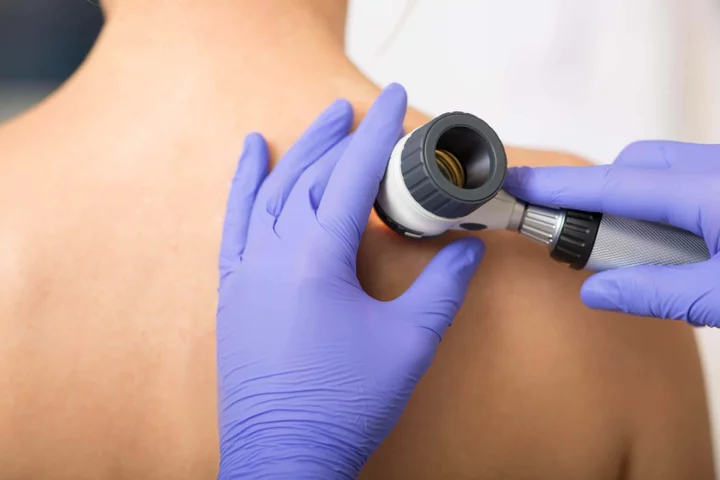
Skin cancer cases reach record high – how to spot the signs
Skin cancer diagnoses in the UK across all ages, have reached a record high of 17,500 every year, according to Cancer Research. This growth shows no sign of stopping. Melanoma skin cancer cases could increase by around 50% over the next 20 years, hitting a record 26,500 a year by 2040, the charity says. So, what should we be looking out for? What are the visible signs? “Visible signs of skin cancer include lumps or patches on the skin, changes in the appearance of moles, or the development of new growths on the skin,” says Catherine Borysiewicz, a dermatologist at King Edward VII’s Hospital, London. “Look for any moles or spots that exhibit irregular borders, uneven colouration, or are larger than the size of a pencil eraser. Additionally, any sores that do not heal or lesions that bleed, itch, or change in size should be monitored closely.” You may be worried a rash could indicate skin cancer, but they are normally safe. “Rashes can be caused by numerous factors, including allergies, infections, autoimmune diseases, or contact with irritants. “Some non-cancerous skin conditions may mimic the appearance of certain types of skin cancer, such as eczema or psoriasis. A dermatologist can help differentiate between these conditions based on a thorough examination and, if necessary, additional diagnostic tests,” she explains. Should I be on the lookout more after sunburn? “Sunburn itself is a sign of skin damage caused by excessive exposure to UV radiation. While it does not directly indicate skin cancer, sunburn can increase your risk of developing skin cancer in the future. Therefore, it is important to be more vigilant and use sun protection measures, to minimise the risk of developing skin cancer later on,” says Borysiewicz. Would I be in pain? “Persistent pain in a skin lesion or an area of the skin can be a potential indicator of skin cancer. Pain associated with skin cancer is typically not the initial symptom, but it can occur as the cancer progresses. If you experience unexplained and prolonged pain in a specific skin area, especially if accompanied by other suspicious signs, it is advisable to consult a dermatologist for further evaluation,” says Borysiewicz. Will I feel unwell? “Skin cancer is primarily diagnosed based on visible changes in the skin. However, it’s important to note that advanced stages of skin cancer may cause systemic symptoms, such as fatigue or weight loss,” she explains. When should I get something checked? “It is essential to get any skin concern checked by a dermatologist if you notice any suspicious changes in your skin. This includes new or changing moles, unusual growths, sores that don’t heal, or any other worrisome skin changes,” she stresses. “Early detection is crucial in successfully treating skin cancer, so it’s better to be cautious and have any concerning skin abnormalities evaluated by a doctor as soon as possible,” Borysiewicz explains. .
1970-01-01 08:00
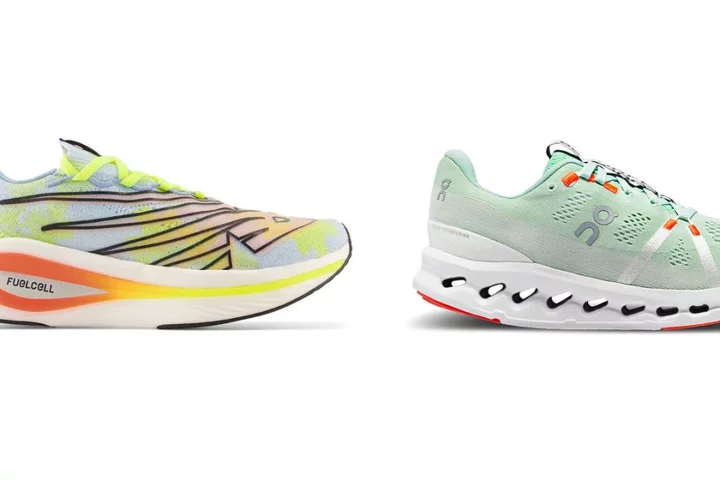
6 of the best new running shoes for summer
Looking to upgrade your running shoes this season, or kickstart a new jogging regime with some swanky new kit? We put these recent releases from a range of top running brands through their paces… 1. Asics Gel-Nimbus 25, £175, asics.com The technical bit: Billed as ‘the most comfortable running shoe’ following consumer tests, Asics have taken cushioning to the max with the Gel-Nimbus 25. Lightweight foam and PureGEL pockets in the soles promise enhanced shock absorption for softer landings and smoother transitions, while the stretchy tongue and collar promise an adaptive fit and stability. The rundown: Despite the super chunky soles, these shoes are pleasingly lightweight. The fit feels a little snug at first (you may want to try them on in store for size) but once I get running, my feet feel very stable and supported. What’s most noticeable about the cushioning is how it supports the whole of the foot at every part of the stride – from striking the concrete to take-off – making for a confident and comfortable run. 2. On Cloudsurfer, £150, On-running.com The technical bit: Ons are known for their revolutionary midsole designs, promising the sensation of ‘running on clouds’ – and the On Cloudsurfer features the brand’s latest design enhancement, CloudTec Phase®, for the ‘smoothest ride’ yet. They’ve upped the sustainability stakes too, using 95% less water in the dying process (compared with conventional methods) for the 100% recycled uppers. The rundown: These are hands-down the most comfortable running shoes I’ve ever worn! They’re so light and flexible, I barely knew I was wearing them – apart from the fact my feet felt super bouncy. They also look very stylish and are easy to clean, which is a bonus. 3. Nike ZoomX Invincible 3 Flyknit Women’s Running Shoes, £169.99, Sports Direct The technical bit: Designed for road running, the design details promise to help reduce injuries, with very thick cushioning a key feature of the rubber soles, along with Nike’s ZoomX midsole technology and lightweight Flynit uppers. The rundown: I could definitely feel the benefits on my longer road runs, thanks to the added comfort and support. My feet and knees felt less achy than usual. It did take me a while to get used to the wide sole design, however, as I’m used to a narrower shoe. But for comfort pounding the pavements, they’re a win. 4. Men’s Featherswift Trail Running Shoes, £90, Helly Hansen The technical bits: These trainers are great for anyone new to trail running, designed with lots of support and cushioning, while remaining light and flexible. And if you’re looking for sustainability, they have a 70% recycled upper, including recycled laces, lining and webbing, as well as zero-waste design elements. The rundown: As described, running in the Featherswifts is light and easy. They have a brilliant grip – which is handy, as all the woodland areas I run in seem to be pretty slippery at the moment – with a good support structure around the heel. As someone who’s prone to ankle rolling, they’re stable enough to give you confidence when running off-road, although they could look a bit more interesting for the price. 5. London Edition FuelCell SuperComp Elite v3, £220, New Balance The technical bit: Made for ‘marathon runners who never let up’, the two-layer FuelCell midsole and carbon fibre plate is said to deliver energy return. The one-piece integrated tongue also ensures a secure and breathable fit. The rundown: With a design inspired by the TCS London Marathon, the look might not be for everyone. These trainers are super expensive and attention-seeking, but they do make you run like a dream and the bounciness is unreal. They somehow seem to make your stride longer, higher and faster (apparently, that’s down to the FuelCell foam, which delivers a ‘propulsive feel’ to help drive you forward, and the energy-boosting carbon fibre plate geometry). If looking cool is more important to you, you might prefer to downgrade to the London Edition Fresh Foam X 880 v13 (more affordable at £140), but if distance is your thing, you won’t regret buying these. 6. Women‘s KIPRUN KS900, £89.99 (were £99.99), Decathlon The technical bit: Designed with longer runs in mind, these trainers promise a cushioned sole – thanks to the new MFOAM cushioning – and extra grip, perfect if you’re going cross-country on wet terrain. With a wider sole than other trainers in the KIPRUN range, these shoes are all about delivering stability – and with the power of your run distributed more evenly across the sole, it aims to keep you comfortable as you clock up the miles. The rundown: I find some running shoes too flimsy, in a bid to be as lightweight as possible. This model strikes the balance perfectly between feeling sturdy enough that my feet were supported, while still being light – so I wasn’t weighed down. As promised, the sole felt comfortable and springy, with plenty of grip to prevent slips. The fit runs on the snug side – but in a good way, meaning my feet felt extra supported as I pounded the pavements.
1970-01-01 08:00
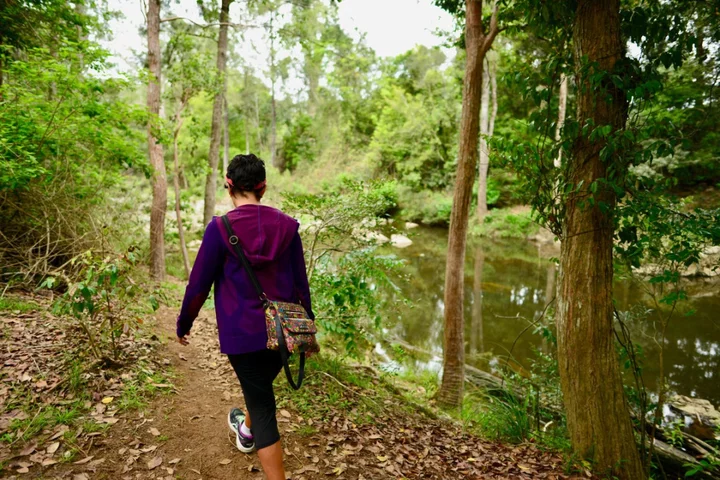
Why it’s so good to do activities alone this summer
I do a lot of activities alone. Not because I don’t have any friends or family who love me and share similar interests, but I’ve grown to enjoy my own company and stepping outside of my comfort zone. The first time I took the plunge was when I went to the Apollo Theatre in Victoria, London, to watch the iconic Wicked The Musical alone for my 21st birthday. I hated it and silently cried throughout the interval, watching people converse with their loved ones. But it taught me several lessons and I have since stopped thinking twice about going anywhere alone. Now, you’d happily find me at the cinema, gig, concert, restaurant, on a solo travel trip and yes, even the theatre, alone. For those thinking about it, but still need convincing, here are some of the reasons why you should try doing activities alone this summer. Increased independence and confidence Apart from learning to appreciate the peace that comes from silence, you could also start learning a new skill or invest in a talent, such as playing an instrument or knitting. “Trying out activities alone can boost your independence and confidence,” said Natalie Viglione, a life, business and spiritual coach who runs Team Gu and the Disrupt Now Program, which helps people and their businesses. “It’s an opportunity to rely on your own judgment and decision-making skills, which can make you feel empowered and more self-assured.” You learn more about yourself It may be easier to coast through life, but taking the time to be self-reflective to learn more about who you are – your likes, dislikes, values and how you are in uncomfortable situations – will provide you with great insight, direction and depth. You might discover new things and experience personal growth along the way too. “The lessons are endless, because the opportunities are too,” said Radha Vyas, CEO and co-founder of group adventure travel company Flash Pack. “Outside of the safety net of your friends and family, you are more open to meeting others, making new friends and creating new connections. The fear of loneliness dissipates almost immediately. Taking on new adventures and experiencing new things [like] solo travelling is life-affirming, and also brings with it a triumphant sense of achievement.” Making new friends Making new friends as an adult isn’t straightforward. But doing activities alone will provide you with countless opportunities to meet people who have similar interests as you. Using solo travelling as an example, Vyas said: “People often feel nervous to travel alone for fear they will be lonely or feel isolated. I’ve travelled solo a lot and have met others at every stage of my journey. “In fact, it’s often hard to have time alone. I think that’s the beauty of travelling solo – you are more open to meeting others and, as a result, wonderful and interesting new friendships form.” Reduced stress and improved mental health There’s a difference between doing activities alone and being lonely. For Lowri-Dowthwaite Walsh, a senior lecturer in psychological interventions at University of Central Lancashire, some people may be more reluctant to spend time alone, because we are often told that we should be with other people. “We are social creatures and tend to crave companionship. We are also aware of negative messages and stereotypes around solitude,” said Walsh. “Some people feel a sense of loneliness when they are alone and may not spend a great deal of time in their own company. Introverted individuals may be more used to being alone than extroverts.” But Walsh goes on to explain that throughout the centuries many philosophers, artists, poets and spiritual leaders have advocated for solitude. “Spending time alone enables you to get to know yourself better. Being alone with one’s thoughts and feelings deepens the relationship with oneself. It also allows for more spiritual and philosophical reflection. Being alone in nature has also been shown to improve wellbeing.” Walsh recommends journaling as a good reflective activity that can be done alone with plenty of time and space. Going for a walk in nature, doing some crafting or painting are also valuable ways to spend time by yourself. Read More Charity boss speaks out over ‘traumatic’ encounter with royal aide Ukraine war’s heaviest fight rages in east - follow live How to make your summer tan last longer Why do I get sick when I go on holiday? As Katie Boulter takes Wimbledon by storm, we look at her best on-court fashion so far
1970-01-01 08:00
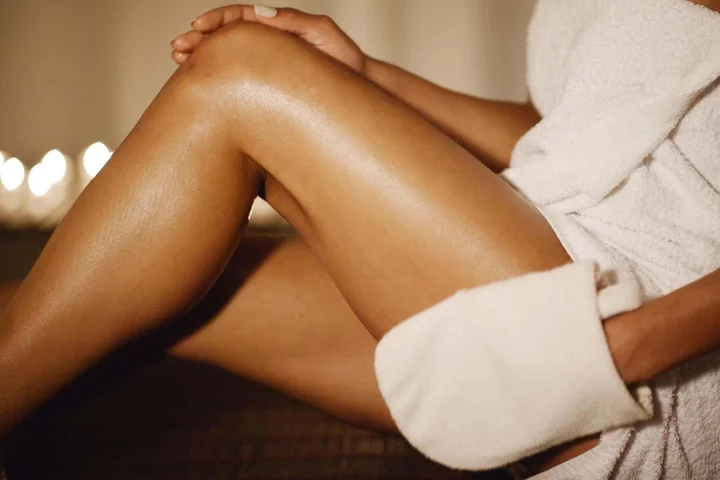
How to make your summer tan last longer
It’s one of the golden rules of summer: everyone feels better with a tan. Whether your tan is from soaking up the rays or from a bottle, you’ll likely want it to linger as long as possible. Luckily, there are plenty of things you can do – before and after getting a tan – to prolong your glow. Of course, if your tan is from the sun, it’s important to be careful with UV rays. “Sunscreen is your best friend when it comes to safeguarding your skin from harmful UV rays. Choose a broad-spectrum sunscreen with an SPF of 40 or higher and apply it generously to all exposed areas of your body. Reapply every two hours, especially after swimming or sweating,” advises skincare formulator and founder of Skin Masterclass, Cigdem Kemal Yilmaz. “Seek shade during peak hours, typically between 12pm and 3pm, and wear protective clothing such as hats and sunglasses.” Real or fake, how can you make your summer tan last longer? Prep your skin beforehand The golden rule of tanning? “Exfoliate before you tan,” says Rachael Robertson, skincare specialist and founder of Bedew Skin. “This will remove the dead skin cells on the outermost layer of the skin giving you a fresh base to work with. Remember that the skin sheds naturally so if you do this before you tan, those outermost cells will stick around longer and so will your tan.” It’s then important to cleanse and moisturise your skin. Robertson says: “Wash thoroughly with your favourite body wash (look for products that are moisturising as this will help hold your tan) when you jump out [the shower] apply moisturiser to slightly damp skin, paying close attention to the backs of the arms, elbows, feet, knees and hands. “If you usually use a body oil, skip it if you are preparing to tan as this can break it down quicker if it’s fake, and may cause burning if it’s real.” Kimberley Medd, head of clinic at Face the Future, recommends moisturising at least 24 hours before applying fake tan. “Any closer, and you can affect the efficacy of the tan as the moisturiser will act as a skin barrier, meaning your tanning product may find it harder to penetrate the skin,” she says. Aveeno Skin Renewal Gentle Body Scrub, £9.99, Boots I Am Proud Sami The Duck Scalp & Body Brush, £8.95 Moisturise afterwards “The best ingredients to prolong your tan are those that moisturise and hydrate, such as squalene, shea butter, vitamin E and glycerin,” says Robertson. Yilmaz agrees with the idea of keeping your skin as hydrated as possible post-tan. “Regularly moisturising your body and face helps maintain optimal skin health and prevents dryness, flakiness, and premature ageing,” she says. “I suggest going for moisturisers that contain ingredients like niacinamide, hyaluronic acid and glycerin, which help retain moisture and provide a plump, radiant appearance.” If you have been in the sun, hydration is even more crucial, Yilmaz says: “After a day of sun exposure, treat your skin with a hydrating after-sun lotion with aloe vera and allantoin to sooth the skin and replenish lost moisture.” And if you want to cheat the system a bit, Robertson adds: “A great tip is to top your tan up with a gradual tanning moisturiser each day so you get the benefits of the moisturising ingredients and a sneaky top-up.” Perricone MD High Potency Hyaluronic Intensive Body Therapy, £51 Arran Apothecary Aloe Vera Body Lotion, £14.50 Bondi Sands Skin Illuminator Gradual Tanning Lotion, £13.99 Don’t strip away your tan “To extend the lifespan of your summer tan, keep your skin moisturised using a lightweight, non-greasy lotion,” says Yilmaz. “Avoid prolonged exposure to chlorinated water as it can fade your tan faster.” If you’ve fake tanned, Medd says: “You should wait three to four days after tan application before you exfoliate to avoid the tan becoming patchy or fading. Exfoliating is a key part of keeping an even, buildable tan as you’re able to remove the dead skin cells for reapplication.” Consider your diet Did you know a healthy diet and drinking plenty of water could help prolong your summer glow? “A balanced diet rich in antioxidants, vitamins, and minerals promotes skin health and radiance,” Yilmaz notes. “I suggest incorporating fruits and vegetables like berries, tomatoes, spinach and kale into your meals, as they contain essential nutrients that protect against sun damage and nourish your skin from within. She continues: “Drink plenty of water to keep your skin hydrated from the inside out. Proper hydration not only helps maintain the elasticity of your skin but also aids in detoxification, ensuring a healthy and vibrant complexion. Aim for at least eight glasses of water per day, and increase your intake when spending time in the sun.”
1970-01-01 08:00
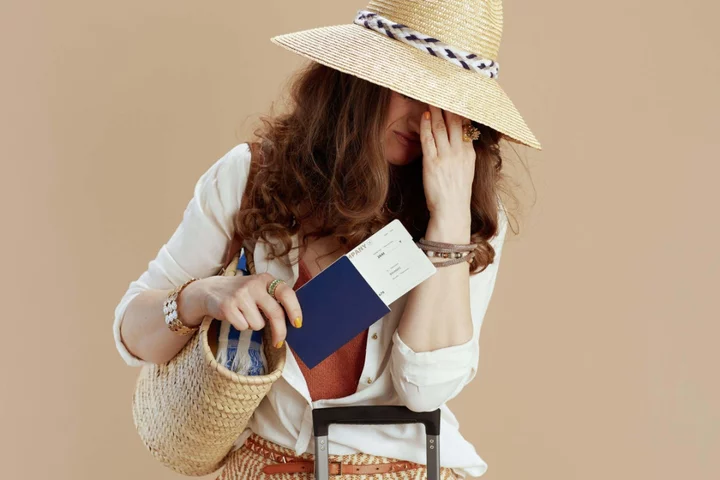
Why do I get sick when I go on holiday?
So you’ve been counting down to your holiday – when you’ll finally have the chance to step off the hamster wheel and relax. Except, no sooner have you checked in at your hotel than you find yourself reaching for the headache pills or tissues, as a niggling cold or migraine takes hold. Sound familiar? If it feels like you suddenly get unwell when you finally hit the pause button, you’re not imagining it – there’s even a medical term for it. The ‘let-down effect’ “This is known as the ‘let-down effect’,” says Dr Suhail Hussain, a personal physician and private home visiting GP. “When the body is used to functioning on high levels of [stress hormones] cortisol and adrenaline and they suddenly decrease, our immune system is exposed and then we’re prone to minor infections and excessive tiredness. “Pain and muscle aches also increase – adrenaline increases muscle tension, so imagine a rubber band always pulled tight, what happens when you let go? “There may also be a spike in mental health problems, such as acute anxiety and panic attacks. Flare-ups in pre-existing chronic conditions is also a common phenomenon, for example migraine and asthma attacks,” he adds. The ‘let-down effect’ can strike after a brief period of intense stress, such as after exams or completing a project, and after positive high-stress events, like planning a wedding. And for many people, it hits when you finally get to put down your to-do list and go on holiday. What’s the deal with stress hormones? Stress hormones serve an important purpose and we need them to function, so they’re not always bad news. “Basically, we are programmed to respond to danger – ‘fight or flight’ – so in stressful situations, there is an increase in levels of stress hormones adrenaline and cortisol,” Dr Hussain explains. “Together, these two hormones control mood, motivation and fear. In periods of stress or heightened anxiety, adrenaline levels rise – causing an overdrive of the sympathetic nervous system, resulting in racing pulse, high blood pressure, sweating, etc.” Stress hormones also play a role in regulating inflammation, metabolising nutrients, and aiding immune function, sleep and energy. But ideally, they wouldn’t stay at raised levels for too long. “If these hormones are always ‘on’, then inflammatory processes are accelerated and your immune system is impaired,” says Dr Hussain. “Consistently high levels of cortisol in your blood can lead to inflammation and a weakened immune system.” Can you avoid the ‘let-down effect’? Dr Hussain says: “You can try to lessen the impact of the ‘let-down effect’ by de-stressing slowly. Instead of crashing and burning, try to maintain a bit of activity on the holiday or some degree of exercise, such that there’s not a massive decrease in stress hormone levels, meaning you can allow the body to acclimatise slowly.” But not getting sick on holiday may not be the only concern here. If your body is giving you warning signs that chronic stress is taking a toll, it’s important to listen. “Constantly running on high levels of stress is very bad for you. It leads to the problems mentioned above but also longer-term consequences, such as plaque formation in arteries, leading to coronary events and strokes, depression and anxiety, and even addiction. Levels of obesity are also increased,” explains Dr Hussain. He says indications to look out for could include: “Recurrent illnesses, feeling tired, lack of energy. Poor response to glucose, leading to type 2 diabetes, elevated blood pressure and disruption of the sleep-wake cycle.” If you have any concerns, check in with your GP. And Dr Hussain suggests finding ways to make managing stress in everyday life. “Build in regular relaxation to your daily schedule. Get out to walk, spend time in the sun, observe nature. Listen to relaxing music. Make a regular sleep schedule, read, spend time with family and loved ones,” he says. “Don’t just work and work and work for the expectation of a big holiday at the end of it.” Read More Charity boss speaks out over ‘traumatic’ encounter with royal aide Ukraine war’s heaviest fight rages in east - follow live As Katie Boulter takes Wimbledon by storm, we look at her best on-court fashion so far Lioness Katie Zelem: Nerves are good – it’s just about channelling them the right way Church of England should scrap fees of up to £641 for weddings, vicar says
1970-01-01 08:00

France's small towns are reeling from the spread of rioting. 'Now it's affecting the countryside'
Tranquil French villages and towns escaped previous cycles of urban violence
1970-01-01 08:00

Lula Replaces Minister in Bid to Solidify His Congressional Base
Brazil’s President Luiz Inacio Lula da Silva yielded to pressure from a prominent political party and agreed to
1970-01-01 08:00

Celebrity Watches in Viral White Party Video Aren’t Quite That Expensive
A TikTok video showing watches worth millions of dollars on celebrities’ wrists, including Jay-Z and Tom Brady, at
1970-01-01 08:00

Hulk Hogan reveals he lost 40 pounds and gave up alcohol after witnessing his body ‘shut down’ on him
Hulk Hogan has spoken candidly about the lifestyle changes he made after his body “shut down” on him, with the former wrestler revealing that he’s given up alcohol completely and lost 40 pounds. The WWE Hall of Famer, 69, opened up about implementing healthier habits during a “Gym & Fridge” video for Men’s Health, where he reflected on his former routines and the impact they ultimately had on his body. In the clip, Hogan, whose real name is Terry Gene Bollea, revealed that his “pre-match meal” used to consist of “three Miller Lites and two Tylenols,” while his post-match meal consisted of “probably 12 Miller Lites”. However, according to Hogan, he decided to give up alcohol entirely six months ago, after he realised he had been using it as a way to “numb” himself. “I don’t drink alcohol at all. I just don’t drink, don’t take Tylenols. I don’t do anything except drink really good water,” Hogan said, before noting that he gave up alcohol “completely” six months ago. “I just got tired of it. It got to be a way to kind of numb me a little bit because I had a bunch of crazy business problems and personal stuff going on at the time.” Hogan also revealed that he chose to stop drinking after realising that he was “getting too aggressive” with alcohol. “I caught myself after I would train, getting too aggressive with alcohol. So I just had to stop it,” he explained. The former professional wrestler, who lost 40 pounds over the last two years, also credited an experience 15 years ago for his decision to change his lifestyle, as Hogan recalled how his body had “shut down” on him after 40 years of wrestling. “About 15 years ago my body kinda shut down on me. I had several knee surgeries … and then after wrestling 40 years almost, my body shut down on me,” he told the outlet. “I went in for one back surgery and it turned into 10 back surgeries. Both knees needed to be replaced. Both hips were replaced. A couple surgeries on my face from getting my orbital socket broken a couple times. “And it ended up being 25 or 26 surgeries, or a couple more, over a 10- or 12-year period.” According to Hogan, the experience “changed the game” for him and encouraged him to change his “whole lifestyle”. “I changed my whole lifestyle because, at the time, being in so much pain and getting older and older, I couldn’t carry that much weight,” he said. “And when you’re sedentary and you’re not moving and wrestling every night, it’s easy to put weight on.” The world renowned wrestling star said he ultimately decided to strive for a weight of 265 pounds, an amount he’d last weighed when he was in “ninth grade”. To reach his goal, and to overhaul his lifestyle, Hogan changed his eating habits, with the 69 year old revealing that he has a cup of yoghurt, a banana and organic coffee for breakfast each morning, while his lunch usually consists of proteins such as chicken, steak or raw tuna. The same is true for Hogan’s dinners, as the wrestler revealed dinner “usually consists of either steak or chicken or tuna”. “It’s pretty much the same,” he admitted, before adding that he also likes to indulge in “organic cookies”. According to Hogan, he also began omitting sugar from his diet after realising it was causing inflammation in his joints. “Sugar had to be eliminated immediately,” he recalled, as he explained that making his body “healthy” became much more important to him than making it “numb”. As for how he feels now, Hogan said he feels “great” and “alive”. “I feel great. Without all the other extra stuff, you actually feel alive, because a little bit of pain makes you know you are alive,” he said. This is not the first time Hogan has opened up about the lifestyle changes he’s made since retiring from wrestling in 2012. In May 2023, the Hogan Knows Best star told Men’s Health that he decided to stop taking pain medicine and drinking alcohol after becoming “sick of the brain fog, the trouble sleeping, feeling tired all the time, and not being myself”. According to Hogan, he was able to get “consistent” with his training “as soon as [he] cut back on the alcohol and straightened out [his] diet”. At the time, Hogan also expressed his gratitude for the lifestyle changes, which he said benefitted him both mentally and physically, as he admitted he “didn’t think this kind of transformation was possible at this stage” in his life. “My whole lifestyle has changed,” he said. Read More Hulk Hogan baffles fans with ‘bizarre’ divorce announcement, says ‘I thought everyone already knew’ Jennifer Lopez defends alcohol brand amid criticism: ‘I drink to be social’ How to go sober if your partner still drinks Father issues warning about mermaid tail swimsuits after daughter almost drowns Daniel Radcliffe says seeing Erin Darke become a mother is ‘most incredible thing’ Fiona Phillips target of telephone scam following Alzheimer’s diagnosis
1970-01-01 08:00

Pickle Pain: Rising Pickleball Injuries Could Result in 67,000 ER Visits This Year
Pickleball mania is causing a strain on the healthcare system.
1970-01-01 08:00
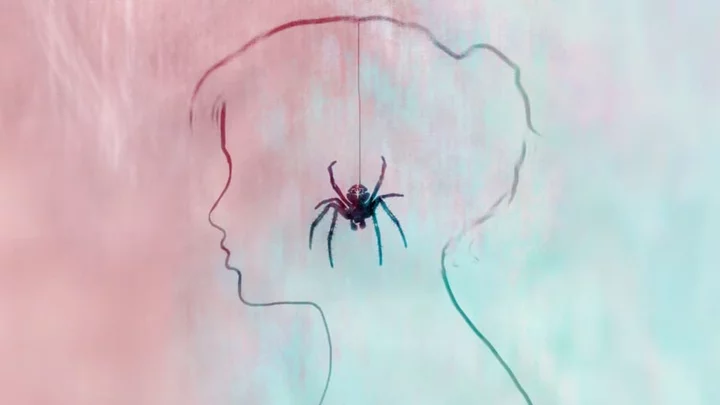
41 Fascinating Phobias, Explained
From acrophobia (the fear of heights) to zuigerphobia (the fear of vacuum cleaners), there are plenty of things to be scared of—rationally or otherwise.
1970-01-01 08:00

7 Ways People Woke Up Before Alarm Clocks
You couldn't hit the snooze button on these wake-up calls.
1970-01-01 08:00
